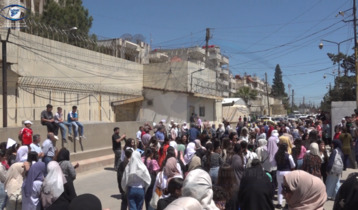-
Trump's New Secretary of State.. Opposed to Withdrawing US Forces Before Regime Change
-
Appointment of Rubio, who opposes withdrawal from Syria, indicates possible shift in US policy toward strengthening military presence in the region

President-elect Donald Trump continues forming his administration, selecting Senator Marco Rubio for Secretary of State and former General Mike Waltz as National Security Advisor.
Rubio's hardline positions on the Syrian file stand out, describing the withdrawal of US forces from Syria as a "grave mistake," emphasizing the necessity of continued US military presence.
The prospective Secretary of State affirms that withdrawal from Syria before regime change would undermine counter-terrorism efforts, indicating that "the United States cannot defeat ISIS until Assad is removed from power."
Rubio participated in introducing legislation to combat normalization with the Syrian regime, considering "Assad's presence in power a major cause of people's radicalization in the region."
The Republican Senator believes regime change should occur through "a group of local alternatives," rejecting reliance on foreign fighters or external forces.
Trump appointed Mike Waltz, former Special Forces officer, as National Security Advisor, describing him as an "expert in confronting threats from China, Russia, Iran, and global terrorism."
Waltz brings extensive military experience as a retired Special Forces officer and National Guard Colonel, along with his political history as Director of Defense Policy for previous Defense Secretaries.
Waltz currently chairs the Armed Services subcommittee overseeing military logistics in the House of Representatives, with membership in the select Intelligence Committee. His positions on Ukraine have shifted, recently calling for a review of US objectives there, preferring to focus resources in the Pacific region.
These appointments have raised concerns in Congress, especially with unclear final election results and worry about vacant Republican seats requiring supplementary elections.
The National Security Advisor position, which doesn't require Senate confirmation, is a pivotal role coordinating between top national security agencies, responsible for briefing the president and implementing his directives.
Levant-Agencies
You May Also Like
Popular Posts
Caricature
BENEFIT Sponsors BuildHer...
- April 23, 2025
BENEFIT, the Kingdom’s innovator and leading company in Fintech and electronic financial transactions service, has sponsored the BuildHer CityHack 2025 Hackathon, a two-day event spearheaded by the College of Engineering and Technology at the Royal University for Women (RUW).
Aimed at secondary school students, the event brought together a distinguished group of academic professionals and technology experts to mentor and inspire young participants.
More than 100 high school students from across the Kingdom of Bahrain took part in the hackathon, which featured an intensive programme of training workshops and hands-on sessions. These activities were tailored to enhance participants’ critical thinking, collaborative problem-solving, and team-building capabilities, while also encouraging the development of practical and sustainable solutions to contemporary challenges using modern technological tools.
BENEFIT’s Chief Executive Mr. Abdulwahed AlJanahi, commented: “Our support for this educational hackathon reflects our long-term strategic vision to nurture the talents of emerging national youth and empower the next generation of accomplished female leaders in technology. By fostering creativity and innovation, we aim to contribute meaningfully to Bahrain’s comprehensive development goals and align with the aspirations outlined in the Kingdom’s Vision 2030—an ambition in which BENEFIT plays a central role.”
Professor Riyadh Yousif Hamzah, President of the Royal University for Women, commented: “This initiative reflects our commitment to advancing women in STEM fields. We're cultivating a generation of creative, solution-driven female leaders who will drive national development. Our partnership with BENEFIT exemplifies the powerful synergy between academia and private sector in supporting educational innovation.”
Hanan Abdulla Hasan, Senior Manager, PR & Communication at BENEFIT, said: “We are honoured to collaborate with RUW in supporting this remarkable technology-focused event. It highlights our commitment to social responsibility, and our ongoing efforts to enhance the digital and innovation capabilities of young Bahraini women and foster their ability to harness technological tools in the service of a smarter, more sustainable future.”
For his part, Dr. Humam ElAgha, Acting Dean of the College of Engineering and Technology at the University, said: “BuildHer CityHack 2025 embodies our hands-on approach to education. By tackling real-world problems through creative thinking and sustainable solutions, we're preparing women to thrive in the knowledge economy – a cornerstone of the University's vision.”
opinion
Report
ads
Newsletter
Subscribe to our mailing list to get the new updates!






















